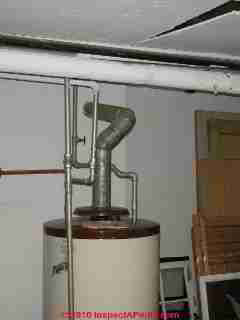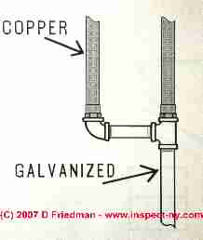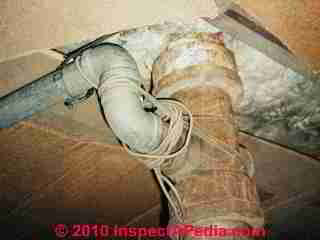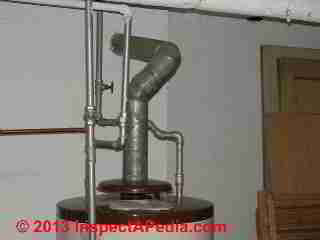 Galvanized Iron Water Supply Piping, & Galvanized Drain Piping
Galvanized Iron Water Supply Piping, & Galvanized Drain Piping
- POST a QUESTION or COMMENT about galvanized iron pipes in buildings: clogs, leaks, repair, replacement of galvanized iron supply pipes or galvanized drain pipes
Galvanized supply or drain pipe troubleshooting: galvanized iron pipes in buildings: clogs, leaks, repair, replacement advice.
Our page top photo illustrates galvanized iron (or some say "galvanized steel") water supply piping in home. This article lists in-depth references on inspecting, testing, and repairing problems with galvanized iron building plumbing: water supply and drain waste vent piping, piping materials, clogged or noisy pipes, and types of pipe hazards or product defects.
InspectAPedia tolerates no conflicts of interest. We have no relationship with advertisers, products, or services discussed at this website.
- Daniel Friedman, Publisher/Editor/Author - See WHO ARE WE?
Galvanized Steel Water Supply Piping in buildings
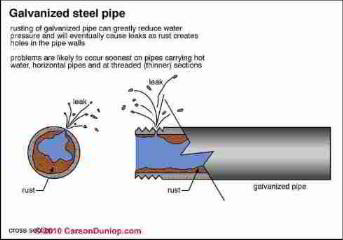
This article discusses
- Galvanized iron pipe inspection, diagnosis, repair
- Diagnosing & repairing clogged galvanized iron water supply pipes
- Diagnosing & repairing clogged galvanized iron drain pipes
- Black iron water piping
- Dielectric fittings to connect copper to galvanized iron piping - avoid corrosion
- Life expectancy of galvanized iron or galvanized steel water piping
The articles at this website will answer most questions about water supply & drain piping, wells, & water tanks as well as many other building plumbing system inspection or defect topics. New York State License # 16000005303 (inception to 2008).
Galvanized steel (iron) is not commonly used as a water entry service pipe, although galvanized steel fittings may be found at the point of entry into the house.
Where galvanized service piping is used, it is typically at least 1 1/4-inch diameter. The word galvanized means zinc-coated. The coating helps prevent the steel from rusting.
Galvanized steel (iron) piping was common until roughly 1950. This piping typically lasts 40 to 60 years.
Some lower-quality pipes do not last as long and there are some oversized pipes still in use after 60 years.
Where it is found today in single-family homes, it is usually near the end of its life.
"Galvanized" refers to a metal plating process that coated iron or steel water pipe surfaces with a corrosion-resistant zinc surface.
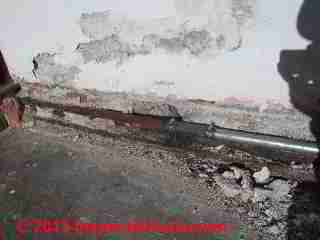
Life expectancy of galvanized steel piping: Galvanized steel supply pipes are typically 1/2-inch diameter. The connections are threaded. When the pipe corrodes, the rust accumulation inside the pipe chokes down the diameter of the pipe, resulting in poor water pressure.
Rust also attacks the pipe walls, making the walls thinner. Eventually, the pipe will rust through, usually at the joints first, resulting in leakage.
Galvanized iron water supply pipe can also burst from freezing, and may split at seams depending on how the pipe was manufactured.
Galvanized iron water supply (or drains) are more likely to burst by splitting or fracturing if pipe sections are corroded from an external cause such as corrosive water or by contact with materials or surfaces that increase the pipe corrosion rate.
Our photo (above left) illustrates a galvanized iron pipe failure (and replacement) at a spa in Lourdes, Mexico.
Black Iron Piping in buildings
Uncommon for water supply piping but found as gas piping, oil piping, and some other uses, is black iron pipe - essentially the same material as galvanized iron piping, but without the protective galvanized zinc coating.
Diagnosing rusty galvanized steel piping
As rust builds up inside the pipe, a brownish color is often noted in the water when a faucet is turned on, especially after several days of inactivity. This rust in the water usually dissipates after a few seconds.
As we mentioned in our discussion of lead water entry mains piping, many of the old lead service lines were connected to a galvanized nipple – a short piece of steel pipe that was often in contact with the soil. This pipe rusts on the outside and inside, and may be close to the end of its life. It is often wise to replace this as a precautionary measure.
Galvanized steel piping will often leak first at the joints. Steel pipe has threads cut into it where it joins a fitting. The pipe wall is thinner at the threaded connections. As the piping rusts from the inside, the pipe rusts through first at the threaded connections, where the pipe wall is thinner.
- Home Reference Book, used with permission.
Our photo (above-left) shows silver-colored water supply piping that is probably galvanized iron. But this pipe looks a little too good. We suspect from the photo that the pipe has been painted.
Watch out: because it's easy to spray-paint silver or aluminum paint on metal pipes in buildings, you may need to check closely or use a magnet to be sure that the silver-colored water supply piping you are examining is really galvanized iron (magnetic) and not painted brass (not magnetic) or painted black iron pipe (magnetic, paint scrapes off).
Also, as our photo above demonstrates, don't miss nearby visually obvious safety hazards like the missing discharge tube on the pressure relief valve on that water heater! If someone spray painted brass water supply piping with aluminum paint you could be fooled.
See BRASS WATER PIPES.
Galvanized Steel Pipe to Copper Pipe Connections - Dielectric Fittings
In most jurisdictions plumbing codes require the use of a dielectric fitting when joining steel piping to copper or other metals; some plumbing jurisdictions permit use of a 6-inch brass nipple in this location as an alternative to diaelectric fittings. Why?
When connecting iron or galvanized iron pipes to copper in buildings, often galvanic corrosion and ultimately plumbing leaks will occur at the meeting of these two dissimilar metals.
Using a dielectric fitting (misspelled as diaelectric or dieelectric) or an approved brass fitting to connect these two metals, or more commonly, using plastic or bronze fittings at the joint between these two metals will avoid future corrosion and leaks.
Details about the requirement for dielectric fittings at copper to steel pipe connetions are
More about the galvanic scale and corrosion between dissimilar metals is
at GALVANIC SCALE & METAL CORROSION.
At ELECTRICAL GROUND SYSTEM INSPECTION we discuss the need for a jumper wire around interruptions in the metal piping system, such as where a diaelect4ric fitting is installed or where a water meter interrupts continuity.
Galvanized Steel Drain Piping in buildings
Our photographs (below) show galvanized drain piping in use in buildings. At below left, the cleanout in a galvanized drain line has been lost, plugged with who-knows-what, and is an odor and leak source. At below-right, the rope trying to secure the galvanized drain line to the cast iron sewer piping confirm a history of leak troubles and improper plumbing connections.
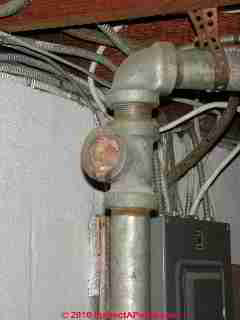
Clogged Galvanized Steel Plumbing Drains
When diagnosing clogged drain piping in a building, an important distinction is between a specific point of clogging and piping that really needs total replacement
. If a point-clog exists it can generally be cleared successfully. When mineral deposits or rust have decreased the interior diameter of galvanized iron pipe drains so that drainage is poor, plumbers use two methods to try to clear the lines:
- Snaking the galvanized drain pipe, sometimes euphemistically "running a wire" through the drains. We paid Plass the Plumber a stiff fee to provide this ineffective service in Poughkeepsie, leading to a big bill and no improvement in the piping. Eventually we opened the walls and cut open the drain line to see that only a very tiny internal diameter of drainage was left in a rust and mineral-clogged pipe.
See CLOGGED DRAIN DIAGNOSIS & REPAIR - Using acid drain cleaners. This process might work if the drain pipes are not too badly clogged and if the steel or iron is otherwise in good condition. Beware of running acid into septic systems.
See WHAT CAN GO INTO TOILETS & DRAINS?
...
Reader Comments, Questions & Answers About The Article Above
Below you will find questions and answers previously posted on this page at its page bottom reader comment box.
Reader Q&A - also see RECOMMENDED ARTICLES & FAQs
On 2018-05-15 - by (mod) -
Anon
OPINION: Sorry but I'm doubtful that a galvanized iron pipe system with many holes is going to get a reliable repair by any additive or internal sealant. What you describe is most likely piping that is rust-perforating from the pipe interior. Such pipe will have many more such rust spots that are about to perforate. Rather than risk recurrent and possibly expensive leaks I'd replace the pipe.
On 2018-05-15 by Anonymous
In my factory galvanised sheet water drainage pipe system, u shape pipe 6 inch base .
The base is leaking by small holes , which chemical or any thing we should use to repair
On 2017-06-12 - by (mod) -
OPINION: I think that would be smart, since there will be moisture in the system that can excite corrosion.
see
Insulation, A. Piping, and B. Insulation Jackets. "SECTION 22 07 19 PLUMBING PIPING INSULATION." DART Facility Improvements Technician’s Latrine Remodel (2012).
Excerpt:
2.9 CONNECTIONS BETWEEN DISSIMILAR METALS
A. Connections between dissimilar metals shall be insulating dielectric types that allow no metal path for electron transfer and that provide a water gap between the connected metals.
This research may also be pertinent, depending on just what plumbing parts are grounded in your system
Hertzberg, Lee B., and Arthur G. Clark. "Use of Water Pipe as an Electric Ground: Joint Discussion." Journal (American Water Works Association) 53, no. 6 (1961): 671-687.
On 2017-06-11 by BD
Should dielectric unions be used in drainage and venting systems where the system includes both copper and galvanized piping?
On 2016-06-16 - by (mod) -
In general, no, the piping left exposed to weather isn't damaged by sunlight. Of course there can be trouble if piping connections are poorly made or piping is not properly supported; And over longer periods rust and corrosion can clog steel water pipes.
On 2016-06-16 by Jairaj Kamthan
when Galvanised steel water piping is laid on the terrace, exposed to sun, but unused, or water not filled for about an year, whether this will affect the piping, screwed joints etc?
On 2016-01-04 - by (mod) -
Mas:
Vermont plumbers are far from the most-expensive in the U.S., earning from $20. to about $25./hour. Labor will be the dominant cost in a piping retrofit job, probably 75% of the cost. How much it would cost to retrofit your particular home can't be guessed from a brief e-text. An estimate will consider
1. the total number of linear feet of piping, and its accessibility: pipes in a basement ceiling are easy to access; pipes in a crawl space, or buried in walls and ceilings are a more costly and time consuming job that may require demolition and repair of those surfaces.
2. materials: feet of pipe, fittings, valves, controls.
The plumber will guesstimate her time in hours or days and the materials and should give you an estimate stating both of those. If you're given only a single "bottom line" price, ask for the details, making clear that you want to be fair when comparing estimates among companies.
The development of Shark-bite and other quick connectors that push on to copper pipe means that a lot of copper piping can be done without soldering, making the job time competitive with using plastic pipe. In the ARTICLE INDEX given above you'll find articles comparing the properties of plastic and copper pipe choices.
On 2016-01-04 by maschnei@vt.edu
I have a 1200 square foot 1.5 story cape cod built in 1945 (one bath down and 1/2 bath upstairs). Kitchen and lower bathroom plumbing are back to back. House has basement. I worry about rust through on the iron water pipes. So far no leaks or noticeably reduced flow.
I live in a small town where we are pretty much at the mercy of the few plumbers in the area, so I am wondering if you can give me a basis for rough estimating the cost of replacing the iron with PVC or copper pipe. Is there any reason to prefer copper to PVC? The work is more than I can handle by myself.
...
Continue reading at DIELECTRIC FITTINGS or select a topic from the closely-related articles below, or see the complete ARTICLE INDEX.
Or see these
Recommended Articles
- CLOGGED SUPPLY PIPES, DIAGNOSIS
- DRAIN & SEWER PIPING - home
- GALVANIC SCALE & METAL CORROSION
- GALVANIZED IRON PIPE INSTALLATION
- LEAK CAUSES in WATER PIPING
- SUPPLY PIPING - home
Suggested citation for this web page
GALVANIZED STEEL WATER PIPING at InspectApedia .com - online encyclopedia of building & environmental inspection, testing, diagnosis, repair, & problem prevention advice.
Or see this
INDEX to RELATED ARTICLES: ARTICLE I NDEX to PLUMBING SYSTEMS
Or use the SEARCH BOX found below to Ask a Question or Search InspectApedia
Ask a Question or Search InspectApedia
Questions & answers or comments about galvanized iron pipes in buildings: clogs, leaks, repair, replacement of galvanized iron supply pipes or galvanized drain pipes
Try the search box just below, or if you prefer, post a question or comment in the Comments box below and we will respond promptly.
Search the InspectApedia website
Note: appearance of your Comment below may be delayed: if your comment contains an image, photograph, web link, or text that looks to the software as if it might be a web link, your posting will appear after it has been approved by a moderator. Apologies for the delay.
Only one image can be added per comment but you can post as many comments, and therefore images, as you like.
You will not receive a notification when a response to your question has been posted.
Please bookmark this page to make it easy for you to check back for our response.
IF above you see "Comment Form is loading comments..." then COMMENT BOX - countable.ca / bawkbox.com IS NOT WORKING.
In any case you are welcome to send an email directly to us at InspectApedia.com at editor@inspectApedia.com
We'll reply to you directly. Please help us help you by noting, in your email, the URL of the InspectApedia page where you wanted to comment.
Citations & References
In addition to any citations in the article above, a full list is available on request.
- John Cranor [Website: /www.house-whisperer.com ] is an ASHI member and a home inspector (The House Whisperer) is located in Glen Allen, VA 23060. He is also a contributor to InspectApedia.com in several technical areas such as plumbing and appliances (dryer vents). Contact Mr. Cranor at 804-873-8534 or by Email: johncranor@verizon.net
- "The Fight Against Corrosion - A Study of the Nature of Corrosion and its Problems in Water Services and Heating Systems", Daniel Davies, Research and Development Services, Stansted Mountfichet, Essex, England, World Plumbing Conference-IV, "Plumbing and the World Environment, Compendium of Workshop Papers, October 3-6, 1996, Hyatt Regency Chicago, Chicago, IL", [personal correspondence, DJF - Author, July 2011]
- Water Pressure Loss - Diagnosis how to determine why water pressure has been lost or why there is no water at all in a building
- In addition to citations & references found in this article, see the research citations given at the end of the related articles found at our suggested
CONTINUE READING or RECOMMENDED ARTICLES.
- Carson, Dunlop & Associates Ltd., 120 Carlton Street Suite 407, Toronto ON M5A 4K2. Tel: (416) 964-9415 1-800-268-7070 Email: info@carsondunlop.com. Alan Carson is a past president of ASHI, the American Society of Home Inspectors.
Thanks to Alan Carson and Bob Dunlop, for permission for InspectAPedia to use text excerpts from The HOME REFERENCE BOOK - the Encyclopedia of Homes and to use illustrations from The ILLUSTRATED HOME .
Carson Dunlop Associates provides extensive home inspection education and report writing material. In gratitude we provide links to tsome Carson Dunlop Associates products and services.


